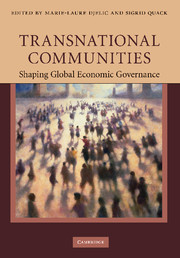Book contents
- Frontmatter
- Contents
- List of figures
- List of tables
- List of appendices
- Contributors
- Preface
- Part I Introduction
- Part II Classical communities with a transnational extension
- Part III Professional communities with a transnational extension
- Part IV Virtual communities
- Part V Transnational interest- or issue-based communities
- Part VI Conclusion
- Index
Preface
Published online by Cambridge University Press: 07 September 2010
- Frontmatter
- Contents
- List of figures
- List of tables
- List of appendices
- Contributors
- Preface
- Part I Introduction
- Part II Classical communities with a transnational extension
- Part III Professional communities with a transnational extension
- Part IV Virtual communities
- Part V Transnational interest- or issue-based communities
- Part VI Conclusion
- Index
Summary
This volume explores the role of transnational communities in economic governance. Transnational communities are social groups emerging from mutual interaction across national boundaries, oriented around a common project and/or “imagined” identity which is constructed and sustained through the active engagement and involvement of at least some of its members. Transnational communities can overlap in different ways with formal organizations but, in principle, they do not need formal organization to be sustained. Transnational communities imply transnational networks, but they are more than that since the notion of community connotes a sense of belonging to a common “culture” in the broadest sense. The sociological literature has had a tendency to attach positive civic values to the concept and reality of “communities.” In contrast, we take, in this volume, a more agnostic stance. As social formations, transnational communities can pursue benevolent and collectively useful goals as well as more particularistic and self-serving ones. They can engage in legal but also in illegal or “gray” activities. As a result, the functions they perform will be judged as desirable in some cases and from certain perspectives but will appear as radically undesirable in other cases or from other perspectives.
The various contributions to this volume explore transnational communities in different empirical terrains – from the Laleli market in Istanbul to private equity in Japan; from the transnational movement for open content licenses to the mobilization in favor of environmental certification or against global warming.
- Type
- Chapter
- Information
- Transnational CommunitiesShaping Global Economic Governance, pp. xix - xxiiPublisher: Cambridge University PressPrint publication year: 2010



